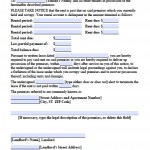Georgia Eviction Notice Forms – Notice to Quit | PDF | Word
 General Notice to Quit | PDF | Word |
|
|
|
Your landlord must follow the proper legal process to evict you. He or she may not change locks, shut off utilities, or otherwise attempt to remove tenants before completing the legal process. In Georgia, the eviction process is called a dispossessory lawsuit. Here is how the process works.
How to File an Eviction in Georgia
If the property owner wishes to evict the tenant because the lease is expiring, the owner must give 30 days’ notice. For evictions because of nonpayment of rent or lease violations, you should provide a general notice, usually three (3) days, stating that the tenant must correct the violation or pay the rent by a particular date, or else you will proceed with an eviction. Georgia law doesn’t require landlords to give tenants a certain length of time for nonpayment and lease violation evictions, but it is reasonable to do so.
- 2. Dispossessory Affidavit
To proceed with the eviction, go to the proper magistrate’s court and complete a Dispossessory Affidavit. This form will include the parties’ names, the reason for eviction, and how much rent is owed if nonpayment of rent is the reason for eviction. The sheriff will serve the affidavit to the tenant, and the tenant will have seven days to answer.
If the tenant does not answer, the owner must apply for a default judgment and a Writ of Possession. The sheriff will serve the Writ, after which the tenant has 24 hours to leave.
If the tenant does answer, the court will schedule a hearing to occur within 10 days.
If there is a hearing with both parties, a judge will listen to both sides’ arguments. It is important to bring evidence related to your case like payment receipts, repair records, and your lease. Witnesses can also be valuable in telling your side of the story. If the judge believes the tenant should be evicted, he or she will issue a Writ of Possession, which the sheriff will serve to the tenant, giving the tenant 24 hours to vacate the premises. The tenant may appeal this decision, but will likely have to pay rent to the court in the meantime.
Sources
We use cookies to improve your experience on our site and to analyse web traffic. To find out more, read our updated privacy policy and terms of use.Ok